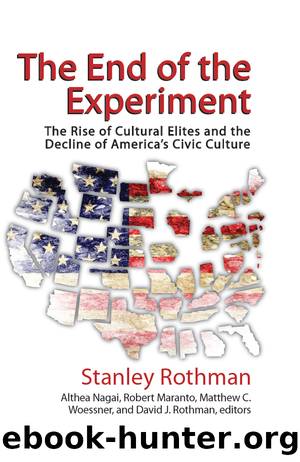The End of the Experiment by Stanley Rothman

Author:Stanley Rothman [Rothman, Stanley]
Language: eng
Format: epub
Tags: Social Science, Sociology, General, Social Classes & Economic Disparity
ISBN: 9781351295628
Google: DKs0DwAAQBAJ
Barnesnoble:
Goodreads: 36704759
Publisher: Routledge
Published: 2015-12-30T00:00:00+00:00
Elite Structure in America: Our View
âEliteâ is a difficult concept, but it carries fewer contradictory meanings in contrast to the concept of class. Like Keller, elites for us are those at the summit of a positional hierarchy, which in turn is presumed to confer power. Specifically, mere membership in certain key institutions can confer elite status (e.g., being a congressman, a reporter for the New York Times, or a federal judge). On the other hand, being in other occupations does not. For example, being in the army in and of itself does not confer elite status, but being a top-ranking military officer does.
Traditional elites are at the top of traditional social structures. In the Rothman-Lichter survey of American elites, data were obtained from the heads of four critical groups: business, corporate law firms, the military, and the federal bureaucracy. The transformation of America into a post-industrial society means that new institutional and occupational groups have emerged in the United States in the last fifty years and/or have grown in influence and power. The sensibilities, attitudes, and beliefs of these new elites differ from those of the traditional elites, and these new groups of elites see themselves in conflict with traditional elites for influence. In the long run, in light of the failure of Marxist, neo-Marxist, and power elite categories to explain the structure and development of the new political culture, it seems reasonable to look to actual points of ideological conflict, to find which groups are struggling over what.
From this perspective, the pluralist theory of elites helps to make sense of the landscape of conflicting groups. According to this schema, the new elites include the creators and transmitters of knowledge and culture (i.e. those who work for publishing houses, libraries, the news media, prime-time television, motion pictures, and universities), some professionals, and activist bureaucrats, as well as public interest group leaders, including those who lead environmental groups, feminist groups, and the ACLU. Their hostility towards the traditional elites grows out of a complex amalgamation of both class and ideological functions that cannot be explained by class alone.
Many of the newer elite groups in America have developed and grown in importance because of the increasing technological complexity of modern life. Specialization and differentiation in the society has resulted in the emergence of new institutions, each of which is maintained by an elite group that legitimates it and is legitimated by it. Psychiatry and social work are but two examples.
As discussed previously, Suzanne Keller suggests four reasons for the proliferation of new strategic elites: population growth, the growth of occupational specialization, the growth of formal organization, and the growth of moral diversity (Keller, 1963, p. 65â84). These factors are interrelated, but (as discussed in chapter 4) communication technology has rapidly diversified and evolved.
Further, the increasing size of the population has led to the development of new (and more indirect) methods of social integration. Whereas the small town once made possible a kind of direct democracy characterized by active citizen participation and widespread
Download
This site does not store any files on its server. We only index and link to content provided by other sites. Please contact the content providers to delete copyright contents if any and email us, we'll remove relevant links or contents immediately.
The European Opportunity by Felipe Fernández-Armesto(568)
The European History Highway: A Guide to Internet Resources by Dennis A. Trinkle Scott A. Merriman(534)
Morgan Kaufmann Digital Watermarking and Steganography by Ingemar Cox Matthew Miller Jeffrey Bloom Jessica Fridrich Ton(528)
The Seven Wonders of the Ancient World by Michael Denis Higgins(518)
Hyperculture by Byung-Chul Han(501)
European Security in a Global Context by Thierry Tardy(501)
European Security without the Soviet Union by Stuart Croft Phil Williams(501)
The Routledge companion to Christian ethics by D. Stephen Long Rebekah L. Miles(496)
Get Real with Storytime by Julie Dietzel-Glair & Marianne Crandall Follis(443)
Hudud Al-'Alam 'The Regions of the World' - a Persian Geography 372 A.H. (982 AD) by V. V. Minorsky & C. E. Bosworth(436)
Gorbachev And His Generals by William C. Green(427)
Tibetan Studies in Comparative Perspective by Chih-yu Shih Yu-Wen Chen(426)
Governance, Growth and Global Leadership by Espen Moe(417)
How Languages Are Learned 5th Edition by Patsy M Lightbown;Nina Spada; & Nina Spada(405)
CliffsNotes on Fitzgerald's The Great Gatsby by Kate Maurer(398)
The Oxford History of the World by Fernández-Armesto Felipe;(388)
The Egyptian Economy, 1952-2000 by Khalid Ikram(376)
Oral Poetry and Narratives from Central Arabia: The Poetry of Ad-Dindan : A Bedouin Bard in Southern Najd (Studies in Arabic Literature, Vol 17) (English and Arabic Edition) by P. M. Kupershoek P. Marcel Kurpershoek(365)
The Oxford Handbook of the Incas by Sonia Alconini(364)
